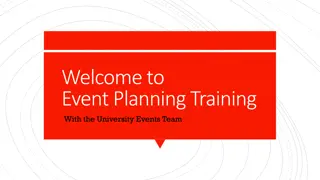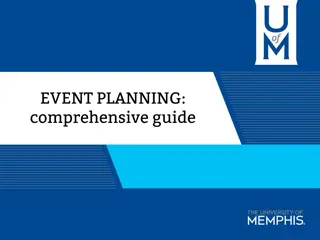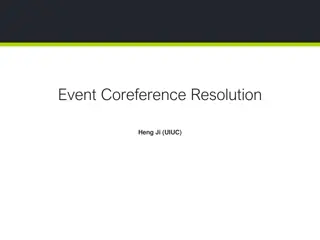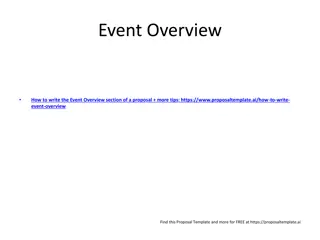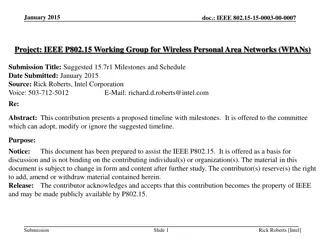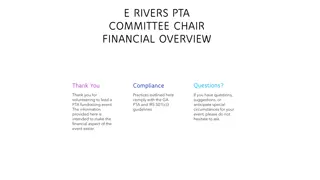Event Planning Timeline for May 2023 by HL Guy de Dinan V.1 AS 58
Assist your event planning with a detailed timeline by HL Guy de Dinan for May 2023. Plan early, decide on themes, secure venue, build core team, and promote the event effectively. Key milestones from 12 months to 4 months before the event are outlined to help you stay organized and successful.
Download Presentation

Please find below an Image/Link to download the presentation.
The content on the website is provided AS IS for your information and personal use only. It may not be sold, licensed, or shared on other websites without obtaining consent from the author.If you encounter any issues during the download, it is possible that the publisher has removed the file from their server.
You are allowed to download the files provided on this website for personal or commercial use, subject to the condition that they are used lawfully. All files are the property of their respective owners.
The content on the website is provided AS IS for your information and personal use only. It may not be sold, licensed, or shared on other websites without obtaining consent from the author.
E N D
Presentation Transcript
Your Event Timeline An Calendar To Assist You In Scheduling Your Planning By HL Guy de Dinan V.1 AS.58, being May 2023 in the Gregorian Calendar
An Overview Key Maxim plan early and check your planning Scheduling, Courts and Royals Reservations Months D - 12 to 6 months Event Publicity Workload and feast planning months D- 4 D-3 Overall Plan Team-Building Review Logistics Updates Liaison D-1 Month D- 2 months Wrap-up EVENT
12 to 6 months before your event Decide on the event set out your basic plan what is your event theme, how big do you want it to be, start documenting your plan (Practical Drachenwald Event toolkit is a good template). Make sure you have a sponsoring group, and agree parameters, including if they are willing to risk a loss (and by how much). Talk to People about your plan official events need sponsoring by a group. Talk to other groups, check for potential event clashes on the calendar Plan Early. SCA planning cycles are notoriously short-term. This causes problems for attendees in booking transport and holiday time. It also loses potential site bookings that are popular with weddings and filming. Large events such as conventions have up to two years advance planning. Find a site and check available dates, terms and conditions. Do not reserve it until your event and budget is approved by the group seneschal. Check cancellation terms and set a decision date if you need to cancel due to poor bookings. At least one site visit is a must. Work out a tentative budget. The Event toolkit has a budget calculator. Decide concessions and complimentary places (Royals, key staff, etc.). Set a reasonable break-even (60- 75% is a good rule of thumb) an even with a higher breakeven than that runs the risk of a loss. Build your core team. Steward, deputy steward (for support and potential take-over), Cook, Head of hall/service, Reservations, Clean-up head, marshal in charge. Schedule Team Meetings. These are a must. Online is most practical. Keep them regular, even if the workload is low. Get the event approved by the group seneschal. If this is an official Barony/Principality/Kingdom event, gain approval appropriately. You may be competing with other bids, so have a plan if rejected. Reserve the date on the kingdom web site event calendar. This is now an easy online form on the Drachenwald calendar. Be aware that while Save The Date entries are possible, they will NOT count as official events until your calendar entry meets the calendar requirements. Set up your online presence. A basic web page at this point is sufficient. This will be where all of your online information will reside. Your social media will point to this. An initial announcement ONCE your event is approved and on the calendar will be a good start.
4 Months Before Event Advertising. Make sure your Dragons Tale Announcement is accurate and your calendar entry has met requirements (if you only submitted a Save the Date). Site Liaison. Keep regular contact with your venue. You need to have a site visit, and also scope any accessibility needs and issues. This is mainly for good relations, but also to avoid isues like double-bookings, asusmptions and miscommunications. Keep written records in case of disputes or error also for any replacement of yourself or the liaison person. Online presence improvements. You should be able to populate your website with details and open reservations. Add transport information public transportation is a must. Describe the journey options form the nearest major transport hub/city to the door of the event. Be aware that you will have late-arriving attendees if you are setting up on a work-day. Advise them of late-night travel issues e.g. last time for bus/train and what to do if they can t catch it. Emails. Post information on the event to Drachenwald (DW-L) and local mailing lists, where available. Website and Promotion. Update your your web site with event information. This is a regular consideration each month. Use pictures, address your audience. Schedule regular promotions. Each major update can provide you with promotion opportunities, e.g. Initial Schedule New activity streams e.g. Prize Plays, traders Opening of Reservations including prices and costs Calls for volunteers. Be specific about what you need and estimated time commitments. Calls for activity leaders and class teachers (depending on your event format) Feast Menu this is both an enticement and also allows people with allergies to frame their queries. The earlier the better on this one. Reservations. Opening reservations allows people to book in and commit, as well as bring in funding. It will also allow you to start calling for volunteers to bulk out your on-the-day event crews kitchen, clean up, activity support, etc. Meetings. Your team will be discussing the overall planning and filling in the blanks on the information you have. Review what risks you might encounter. Go through the accessibility checklist. Check your budget, what is your risk of a loss? If you and your team are feeling overloaded, bring in more people to help.
3 Months Before Your Event Dragon s Tale/Calendar. Make sure your Calendar entry still matches your event information. Royalty/VIPs. Double-check if any Royals are planning on coming. See the guide on how to wrangle them. Appoint a specific royal liaison member of your team. Royals tend to mean Courts, so make sure your schedule can be flexible. NB only Official Events (that met announcement criteria) can have official Courts. You do not want to have to appeal to the SCA Boardo f Directors for retroactive recognition. Event Schedule. Your schedule should be firming up at this point. It is worth considering severe weather changes e.g. heat wave or extreme wet, and if your event is complex e.g. a Kingdom University or a long-camp, appoint a separate Schedule Steward to look after the maintenance. The Practical Drachenwald toolkit has a function for near-real time updates to your calendar schedule, including PDF downloads. Promotion. It is worth considering your promotion timetable and posting about your event. Teambuilding. Remind your team heads that they need to start recruiting. These calls are also good updates on social media. Event Tokens. Are you having any? If so, where are you sourcing them from? Do they need production time? How much do they cost? Update your website an unfinished and/or out of date website will lose you attendees.
2 Months Before The Event Review your game plan. At this stage you and your team ought to review the state of affairs. Is your information up to date? How are your sign ups looking? If you think you are still risking a large loss, you need to discuss with your sponsoring group. Double-check your food budget. Food prices are variable. Most Drachenwald cooks are aware and flexible enough to deal with budget changes and also catering for allergies. Promotion. Regular promotion is good at this stage. Make sure all of your information is consistent. Get a provisional schedule as early as possible. This helps people plan their event, especially daytrippers. Details can come later. Website updates. Online information is good and will help people decide whether or not to come, as well as sort out their transport/day-trips. Make sure the Code of Conduct is visible on your site. Make sure transport directions and options are available, including parking. Site Liaison. Check in with your venue, make sure they understand what activities you are planning so you don t have on-the- day issues. Team Meetings. Most of your planning is likely in place. Use this time to address details and minor issues. Check your risk assessment for any new issues. Check your budget. Logistics. Does your event need kit? E.g. thrones, decorations, kitchen and serving equipment, safety equipment, fighting area rope/barriers, etc.? List it. List who has them, who is transporting them to and transporting them from the site.
1 Month Before Your Event Team-building. Check in with your team, make sure they are all comfortable with their roles. Check they have enough people in support, and ask the booked attendees for more support if need be. At this stage, most teams are aware of what they are to do and not under much stress. Make sure people know the emergency routines and site emergency rules. Booked Attendees. Send an update message on email and on social media. This should be a summary of what they can expect, mention if they need to bring bedding, times on and off site, etc. Remind them of the Code of Conduct. Remind them of directions include landmarks in your instructions for people who have never been there before. Advise them of the site rules e.g. naked flames, emergency exits, etc. Sign-in. Make sure your Reservations steward has support on the sign-in desk. Make sure they and their team know what to do with signing in, cash float (if used), attendee list and a printed copy of the Code of Conduct Site Liaison. Confirm final arrangements, any coordination with the custodians. Who is their emergency contact if you need to contact them? Who has the physical keys to unlock and lock up the site? Transport. Make sure your attendees know where to look for mass transportation information that is up to date, especially for seasonal or even weekday changes. Also where to look for news if there are threats of strikes for instance. Budget. Check with your cooking team how they are covering acquisition of the food. Do you have any other up-front expenses? Check the Finance Policies applying to your event/group and liaise with the Exchequer/Finance Committee of your sponsoring group.
At The Event Keep your cool. Make sure you have time for yourself and for your deputy to share time and responsibility. Hydrate and remember to eat. If you need some private time, make sure to delegate and if people ask you while you are resting, direct them to your deputy. Helpers. People are willing to help, do not hesitate in asking for helpers, either in general or personally. Clean Up. Make sure your head of clean up has got enough people to help. Particularly kitchen-cleaning. Make sure of toilets and carpets can be cleaned and in good time. It is a risk for you and your event crew to be left at the end of an event with a cleaning effort when you are all tired. Be Prepared. Expect changes in your schedule and to improvise solutions. If you are changing something on the spot, explain your thinking and make the change. Sometimes you will be on a time pressure and not have a clear solution. Complaints. Sometimes you cannot please everyone. If it is a simple oversight, thank the person for raising the issue and you will see if the issue can be remedied. If a complaint is actually just feedback, ask them to please put it in writing as you are still responsible for the event as a whole and likely to not remember the issue. Be aware of the SCA complaints process, Code of Conduct, and Bullying and Harassment policy and know who you have to go to in order to report complaints within those remits. Expenses. Budgets are not 100% predictable, so if you need any last-minute purchases, make sure you retain the receipts and note what they were for, as well as who needs paying for them. Keep them secure. No receipt = no repayment.
Wrapping Up Well done! Organising an SCA event, large or small, is a significant feat for anyone. Whether this is your first or thirty-first event, each one is unique and fruitful exercise in community-building. Don t forget to add event management to your CV! Wash-up Meeting. Organise a team meeting about a fortnight afterwards to thank your team and review how it went. Even though things might have gone wrong or you would do something different next time, there will have been a lot of positive notes to be proud of. Reporting. Events in the SCA tend to be reduced to just the surplus/loss balance sheet. Liaise with your head cook and make sure they evidence their expenses. Make sure your Exchequer is expecting these receipts and tell them who they expect to be reimbursing. Celebrate! Publicly thank your team. Put an article into the newsletters and online. Lessons Learned. Make a note to yourself as to how things went, what went right, what went wrong, what can be improved/. Were you missing any support? Pass this on to the sponsoring seneschal and Practical Drachenwald so we can share your experiences and add to the SCA knowledge.





